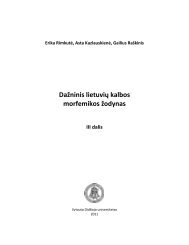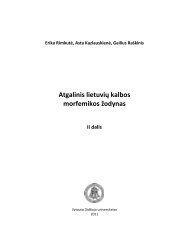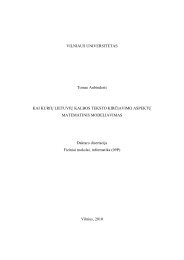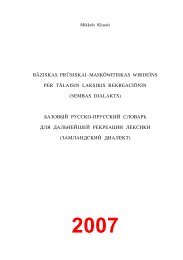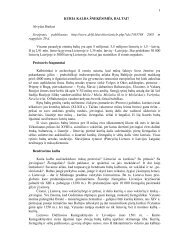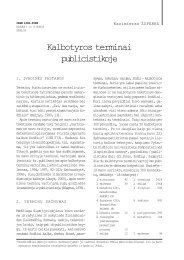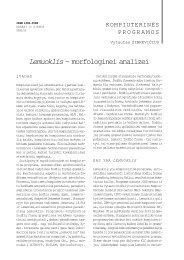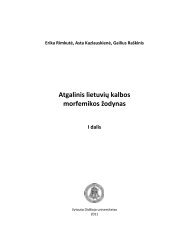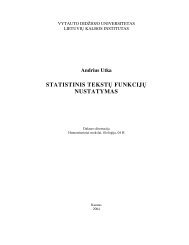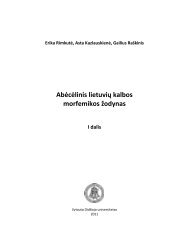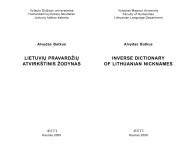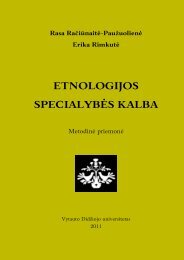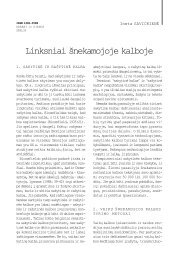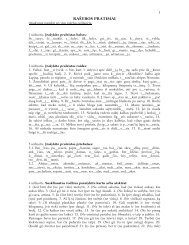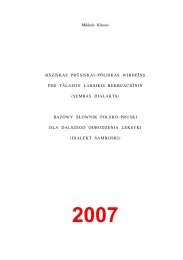HISTORICAL GRAMMAR OF OLD PRUSSIAN
HISTORICAL GRAMMAR OF OLD PRUSSIAN
HISTORICAL GRAMMAR OF OLD PRUSSIAN
You also want an ePaper? Increase the reach of your titles
YUMPU automatically turns print PDFs into web optimized ePapers that Google loves.
52<br />
V. Maþiulis<br />
* 111. Dat.pl. is formed with the morph -mans (cf. * 103): (III)<br />
genn`mans ‘wives’, mergûmans ‘maidens’, widdewûmans ‘widdows’.<br />
* 112. Acc. pl. ends in -ans on place of earlier -as (cf. adv.<br />
perpettas III 35 , PEÞ III 268 f.) < Pr. *-`s (> Lith.-Latv. -as): deinans<br />
1<br />
‘days’, gennans ‘wives’, r`nkans ‘hands’, billijsnans ‘sayings’, etc., cf. BS<br />
311 f., Rosinas BÁM 46 and Endzelîns LVG 419, SV 64, Berneker<br />
PS 195, Kazlauskas LKIG 186.<br />
Ùa- and iÙa-stems<br />
* 113. The evolution of these paradigms in Prussian (as well as in<br />
Lithuanian and Latvian) underwent multiple reciprocal contamination as<br />
well as a strong influence of the i-stem paradigm (cf. Endzelîns SV 60<br />
ff., Stang Vergl. Gr. 191 f., 194 f.), see further.<br />
Nom.-acc. sg. neut. ends in (Ùa-stem) *-’an in (E): median<br />
‘forest’ (= *med’an), eristian ‘lamb’ (= *Ùçrist’an, PEÞ I 284), wargien<br />
‘copper’ (= *var’an, PEÞ IV 221), etc.<br />
Nom. sg. masc. occurs with following inflections in (E): a) an<br />
iÙa-stem *-îs, cf. rikis ‘lord’ (= *rîkîs), and b) (i)Ùa-stem *-îs, cf. [c]uylis<br />
‘boar’ (= *kuilîs), kadegis ‘juniper’ (= *kadegîs), angurgis ‘eel’ (= *angur’îs,<br />
PEÞ I 79), etc. In the Catechisms the iÙa-stem inflection *-îs was shortened<br />
into *-Ÿs, if the stress had been retracted from it to the stem: bousennis<br />
(III) ‘position (situation)’ (= *bûsenis with the 1st syllable stressed, cf.<br />
spelling -ou-!), nosçilis (III) ‘spirit’ (= *nôs…eilis with the main stress on<br />
the 1st syllable and the secondary occasional stress on the 2nd syllable, cf.<br />
47 One should reconstruct: Baltic iÙa-stem nom. sg. (masc.) *(dag)-ija-s ‘thistle’ (borrowed into<br />
Estonian takijas!), Ùa-stem – *(svet)-ja-s ‘alien’, i-stem – *(vag)-i-s ‘thief’ (cf. Kazlauskas<br />
LKIG 178 ff.). Nom. sg. masc. a-stem *-as should have lost its accent in oxytone nouns (OInd.<br />
vîr³-, but Pr. Cat. wijrs) when IE fientive (“active”) case *-as differentiated (Palmaitis BGR<br />
47, 78–83) into gen. *-as and nom. *-as (for syntactical differentiation in Anatolian cf. Èâàíîâ<br />
Âÿ÷. Âñ. Îáùåèíäîåâðîïåéñêàÿ, ïðàñëàâÿíñêàÿ è àíàòîëèéñêàÿ ÿçûêîâûå<br />
ñèñòåìû / Ìîñêâà: Íàóêà 1965, p. 54). Then the stress in oxytone *-ija-s was retracted<br />
from *a to previous *i. This led to a syncopation *-ija-s > *-ij-s > *-îs (cf. Lith. dag…ys ‘thistle’,<br />
Pr. rikîs ‘lord’). Since as a result the morphilogical contrast between nom. *-îs and acc. *-ijan<br />
became unclear, the latter form was replaced with acc. *-în > *-in which coincided with the i-



